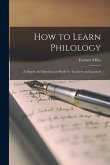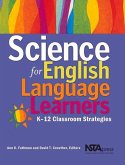Reading Success for Struggling Adolescent Learners
Herausgeber: Lenski, Susan; Lewis, Jill
Reading Success for Struggling Adolescent Learners
Herausgeber: Lenski, Susan; Lewis, Jill
- Broschiertes Buch
- Merkliste
- Auf die Merkliste
- Bewerten Bewerten
- Teilen
- Produkt teilen
- Produkterinnerung
- Produkterinnerung
Comprehensive, up to date, and highly practical, this volume discusses factors that affect struggling readers in grades 7-12 and provides research-based strategies for improving their reading and writing skills. Chapters from leading authorities examine why some adolescents have trouble achieving reading proficiency, describe schoolwide policies and programs that support literacy, and suggest age-appropriate classroom practices for promoting reading success. The book shows how literacy skills and strategies can be incorporated into instruction in all areas of the curriculum. Essential topics…mehr
Andere Kunden interessierten sich auch für
![Adolescent Literacy and the Teaching of Reading Adolescent Literacy and the Teaching of Reading]() Deborah ApplemanAdolescent Literacy and the Teaching of Reading28,99 €
Deborah ApplemanAdolescent Literacy and the Teaching of Reading28,99 €![An English Spelling-book [microform]: With Reading Lessons Adapted to the Capabilities of Children: in Three Parts, Calculated to Advance the Learners An English Spelling-book [microform]: With Reading Lessons Adapted to the Capabilities of Children: in Three Parts, Calculated to Advance the Learners]() Lindley MurrayAn English Spelling-book [microform]: With Reading Lessons Adapted to the Capabilities of Children: in Three Parts, Calculated to Advance the Learners24,99 €
Lindley MurrayAn English Spelling-book [microform]: With Reading Lessons Adapted to the Capabilities of Children: in Three Parts, Calculated to Advance the Learners24,99 €![Success with Phonics Success with Phonics]() Allison C HallSuccess with Phonics12,99 €
Allison C HallSuccess with Phonics12,99 €![Introduction to the English Reader, or, A Selection of Pieces in Prose and Poetry: Calculated to Improve the Younger Classes of Learners in Reading an Introduction to the English Reader, or, A Selection of Pieces in Prose and Poetry: Calculated to Improve the Younger Classes of Learners in Reading an]() Lindley MurrayIntroduction to the English Reader, or, A Selection of Pieces in Prose and Poetry: Calculated to Improve the Younger Classes of Learners in Reading an20,99 €
Lindley MurrayIntroduction to the English Reader, or, A Selection of Pieces in Prose and Poetry: Calculated to Improve the Younger Classes of Learners in Reading an20,99 €![Introduction to the English Reader, or, A Selection of Pieces in Prose and Poetry [microform]: Calculated to Improve the Younger Classes of Learners i Introduction to the English Reader, or, A Selection of Pieces in Prose and Poetry [microform]: Calculated to Improve the Younger Classes of Learners i]() Lindley MurrayIntroduction to the English Reader, or, A Selection of Pieces in Prose and Poetry [microform]: Calculated to Improve the Younger Classes of Learners i20,99 €
Lindley MurrayIntroduction to the English Reader, or, A Selection of Pieces in Prose and Poetry [microform]: Calculated to Improve the Younger Classes of Learners i20,99 €![How to Learn Philology: A Simple and Introductory Book for Teachers and Learners How to Learn Philology: A Simple and Introductory Book for Teachers and Learners]() Eustace MilesHow to Learn Philology: A Simple and Introductory Book for Teachers and Learners26,99 €
Eustace MilesHow to Learn Philology: A Simple and Introductory Book for Teachers and Learners26,99 €![Science for English Language Learners Science for English Language Learners]() Ann K FathmanScience for English Language Learners61,99 €
Ann K FathmanScience for English Language Learners61,99 €-
-
-
Comprehensive, up to date, and highly practical, this volume discusses factors that affect struggling readers in grades 7-12 and provides research-based strategies for improving their reading and writing skills. Chapters from leading authorities examine why some adolescents have trouble achieving reading proficiency, describe schoolwide policies and programs that support literacy, and suggest age-appropriate classroom practices for promoting reading success. The book shows how literacy skills and strategies can be incorporated into instruction in all areas of the curriculum. Essential topics include assessment; building core competencies, such as fluency, comprehension, and vocabulary; and working with struggling adolescent English language learners.
Hinweis: Dieser Artikel kann nur an eine deutsche Lieferadresse ausgeliefert werden.
Hinweis: Dieser Artikel kann nur an eine deutsche Lieferadresse ausgeliefert werden.
Produktdetails
- Produktdetails
- Verlag: Guilford Publications
- Seitenzahl: 352
- Altersempfehlung: 12 bis 17 Jahre
- Erscheinungstermin: 1. April 2008
- Englisch
- Abmessung: 227mm x 153mm x 23mm
- Gewicht: 490g
- ISBN-13: 9781593856762
- ISBN-10: 1593856768
- Artikelnr.: 23118581
- Herstellerkennzeichnung
- Libri GmbH
- Europaallee 1
- 36244 Bad Hersfeld
- gpsr@libri.de
- Verlag: Guilford Publications
- Seitenzahl: 352
- Altersempfehlung: 12 bis 17 Jahre
- Erscheinungstermin: 1. April 2008
- Englisch
- Abmessung: 227mm x 153mm x 23mm
- Gewicht: 490g
- ISBN-13: 9781593856762
- ISBN-10: 1593856768
- Artikelnr.: 23118581
- Herstellerkennzeichnung
- Libri GmbH
- Europaallee 1
- 36244 Bad Hersfeld
- gpsr@libri.de
Susan Lenski, EdD, is Professor of Curriculum and Instruction at Portland State University, where she teaches graduate reading and language arts courses. Previously, Dr. Lenski taught school for 20 years, working with children from kindergarten through high school. During her years as a teacher, she was awarded the Nila Banton Smith Award from the International Reading Association (IRA) for integrating reading in content-area classes and was instrumental in leading her school to receive an Exemplary Reading Program Award. Dr. Lenski was inducted into the Illinois Reading Hall of Fame in 1999, and she served on the IRA Board of Directors from 2004 to 2007. Her research interests focus on strategic reading and writing, adolescent literacy, preparing teacher candidates, and social justice education. She has published more than 65 articles and 14 books. Â Jill Lewis, EdD, is Professor of Literacy Education at New Jersey City University, where she teaches graduate courses in reading, and reading development courses to underprepared freshmen. Previously she taught high school English and reading in public schools and at a community college. Dr. Lewis is a past member of the IRAâEUR(TM)s Board of Directors (2004 to 2007), chaired IRAâEUR(TM)s Government Relations Committee, is an IRA Volunteer Education Consultant for a secondary school literacy project in Macedonia, and volunteered in IRAâEUR(TM)s Reading and Writing for Critical Thinking project. She served on several state-level task forces, including the New Jersey Task Force on Middle School Literacy, and co-chaired New JerseyâEUR(TM)s Task Force for Curriculum Framework for Language Arts Literacy. Dr. Lewis was a Princeton University Faculty Fellow for policy studies and directed community leadership programs in New Jersey. The New Jersey Reading Association awarded her its Distinguished Service Award in 2002. She has authored numerous articles on adolescent literacy, professional development, advocacy, and content-area reading, and has published several books.
Introduction, Susan Lenski and Jill Lewis
I. Understanding Struggling Adolescent Readers
1 What Do We Know about the Adolescent Learner and What Does It Mean for
Literacy Instruction?, Jill Lewis and Avivah Dahbany
2. Struggling Adolescent Readers: Problems and Possibilities, Susan Lenski
3. Nurturing Resilience among Adolescent Readers, Alfred W. Tatum and
Teresa A. Fisher
4. Teaching Adolescent English Language Learners, Fabiola P. Ehlers-Zavala
II. Organizing Classroom Contexts That Promote Literacy
5 The Role of Technology in Supporting Struggling Readers, Dana Grisham
and Thomas DeVere Wolsey
6. Engaging Struggling Adolescent Readers in Conversations about Texts:
Instructional Strategies for Successful Experiences, Kathleen
Crawford-McKinney and Kattie Hogan
7. Making Time for Independent Reading, Susan Lenski and Erexenia Lanier
III. Implementing Classroom Instruction for Struggling Adolescent Readers
8. Fluency Strategies for Struggling Adolescent Readers, Gay Fawcett and
Timothy Rasinski
9. Comprehension Strategies that Make a Difference for Struggling Readers,
Micki M. Caskey
10. Vocabulary Strategies for Struggling Readers, Margaret Ann Richek and
Becky McTague
11. Classroom Instruction for Struggling Writers, Leif Fearn and Nancy
Farnan
12. Teaching from a Critical Literacy Perspective and Encouraging Social
Action, Susan Lenski
IV. Developing Schoolwide Contexts to Support Achievement
13 Meaningful Assessment of Struggling Adolescent Readers, Peter Afflerbach
14. Literacy Coaching at the Middle School/High School Levels, Rita Bean
15. Keeping Parents Involved in Their ChildrenâEUR(TM)s Education during
the Middle and High School Years, Laurie Elish-Piper
16. âEURBut IâEUR(TM)m Not Going to College!âEUR: Developing
AdolescentsâEUR(TM) Literacy for the 21st-Century Workplace, Jill Lewis
I. Understanding Struggling Adolescent Readers
1 What Do We Know about the Adolescent Learner and What Does It Mean for
Literacy Instruction?, Jill Lewis and Avivah Dahbany
2. Struggling Adolescent Readers: Problems and Possibilities, Susan Lenski
3. Nurturing Resilience among Adolescent Readers, Alfred W. Tatum and
Teresa A. Fisher
4. Teaching Adolescent English Language Learners, Fabiola P. Ehlers-Zavala
II. Organizing Classroom Contexts That Promote Literacy
5 The Role of Technology in Supporting Struggling Readers, Dana Grisham
and Thomas DeVere Wolsey
6. Engaging Struggling Adolescent Readers in Conversations about Texts:
Instructional Strategies for Successful Experiences, Kathleen
Crawford-McKinney and Kattie Hogan
7. Making Time for Independent Reading, Susan Lenski and Erexenia Lanier
III. Implementing Classroom Instruction for Struggling Adolescent Readers
8. Fluency Strategies for Struggling Adolescent Readers, Gay Fawcett and
Timothy Rasinski
9. Comprehension Strategies that Make a Difference for Struggling Readers,
Micki M. Caskey
10. Vocabulary Strategies for Struggling Readers, Margaret Ann Richek and
Becky McTague
11. Classroom Instruction for Struggling Writers, Leif Fearn and Nancy
Farnan
12. Teaching from a Critical Literacy Perspective and Encouraging Social
Action, Susan Lenski
IV. Developing Schoolwide Contexts to Support Achievement
13 Meaningful Assessment of Struggling Adolescent Readers, Peter Afflerbach
14. Literacy Coaching at the Middle School/High School Levels, Rita Bean
15. Keeping Parents Involved in Their ChildrenâEUR(TM)s Education during
the Middle and High School Years, Laurie Elish-Piper
16. âEURBut IâEUR(TM)m Not Going to College!âEUR: Developing
AdolescentsâEUR(TM) Literacy for the 21st-Century Workplace, Jill Lewis
Introduction, Susan Lenski and Jill Lewis
I. Understanding Struggling Adolescent Readers
1 What Do We Know about the Adolescent Learner and What Does It Mean for
Literacy Instruction?, Jill Lewis and Avivah Dahbany
2. Struggling Adolescent Readers: Problems and Possibilities, Susan Lenski
3. Nurturing Resilience among Adolescent Readers, Alfred W. Tatum and
Teresa A. Fisher
4. Teaching Adolescent English Language Learners, Fabiola P. Ehlers-Zavala
II. Organizing Classroom Contexts That Promote Literacy
5 The Role of Technology in Supporting Struggling Readers, Dana Grisham
and Thomas DeVere Wolsey
6. Engaging Struggling Adolescent Readers in Conversations about Texts:
Instructional Strategies for Successful Experiences, Kathleen
Crawford-McKinney and Kattie Hogan
7. Making Time for Independent Reading, Susan Lenski and Erexenia Lanier
III. Implementing Classroom Instruction for Struggling Adolescent Readers
8. Fluency Strategies for Struggling Adolescent Readers, Gay Fawcett and
Timothy Rasinski
9. Comprehension Strategies that Make a Difference for Struggling Readers,
Micki M. Caskey
10. Vocabulary Strategies for Struggling Readers, Margaret Ann Richek and
Becky McTague
11. Classroom Instruction for Struggling Writers, Leif Fearn and Nancy
Farnan
12. Teaching from a Critical Literacy Perspective and Encouraging Social
Action, Susan Lenski
IV. Developing Schoolwide Contexts to Support Achievement
13 Meaningful Assessment of Struggling Adolescent Readers, Peter Afflerbach
14. Literacy Coaching at the Middle School/High School Levels, Rita Bean
15. Keeping Parents Involved in Their ChildrenâEUR(TM)s Education during
the Middle and High School Years, Laurie Elish-Piper
16. âEURBut IâEUR(TM)m Not Going to College!âEUR: Developing
AdolescentsâEUR(TM) Literacy for the 21st-Century Workplace, Jill Lewis
I. Understanding Struggling Adolescent Readers
1 What Do We Know about the Adolescent Learner and What Does It Mean for
Literacy Instruction?, Jill Lewis and Avivah Dahbany
2. Struggling Adolescent Readers: Problems and Possibilities, Susan Lenski
3. Nurturing Resilience among Adolescent Readers, Alfred W. Tatum and
Teresa A. Fisher
4. Teaching Adolescent English Language Learners, Fabiola P. Ehlers-Zavala
II. Organizing Classroom Contexts That Promote Literacy
5 The Role of Technology in Supporting Struggling Readers, Dana Grisham
and Thomas DeVere Wolsey
6. Engaging Struggling Adolescent Readers in Conversations about Texts:
Instructional Strategies for Successful Experiences, Kathleen
Crawford-McKinney and Kattie Hogan
7. Making Time for Independent Reading, Susan Lenski and Erexenia Lanier
III. Implementing Classroom Instruction for Struggling Adolescent Readers
8. Fluency Strategies for Struggling Adolescent Readers, Gay Fawcett and
Timothy Rasinski
9. Comprehension Strategies that Make a Difference for Struggling Readers,
Micki M. Caskey
10. Vocabulary Strategies for Struggling Readers, Margaret Ann Richek and
Becky McTague
11. Classroom Instruction for Struggling Writers, Leif Fearn and Nancy
Farnan
12. Teaching from a Critical Literacy Perspective and Encouraging Social
Action, Susan Lenski
IV. Developing Schoolwide Contexts to Support Achievement
13 Meaningful Assessment of Struggling Adolescent Readers, Peter Afflerbach
14. Literacy Coaching at the Middle School/High School Levels, Rita Bean
15. Keeping Parents Involved in Their ChildrenâEUR(TM)s Education during
the Middle and High School Years, Laurie Elish-Piper
16. âEURBut IâEUR(TM)m Not Going to College!âEUR: Developing
AdolescentsâEUR(TM) Literacy for the 21st-Century Workplace, Jill Lewis

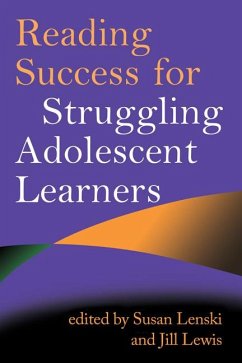
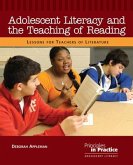
![An English Spelling-book [microform]: With Reading Lessons Adapted to the Capabilities of Children: in Three Parts, Calculated to Advance the Learners An English Spelling-book [microform]: With Reading Lessons Adapted to the Capabilities of Children: in Three Parts, Calculated to Advance the Learners](https://bilder.buecher.de/produkte/65/65574/65574341m.jpg)
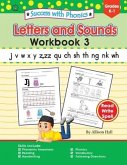
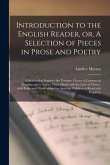
![Introduction to the English Reader, or, A Selection of Pieces in Prose and Poetry [microform]: Calculated to Improve the Younger Classes of Learners i Introduction to the English Reader, or, A Selection of Pieces in Prose and Poetry [microform]: Calculated to Improve the Younger Classes of Learners i](https://bilder.buecher.de/produkte/65/65581/65581692m.jpg)
